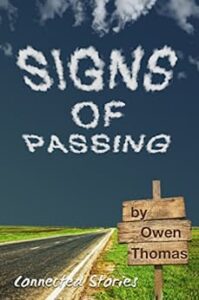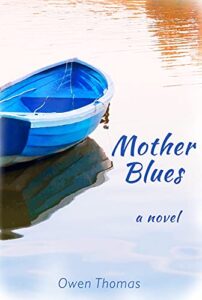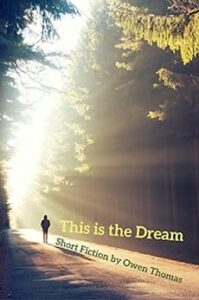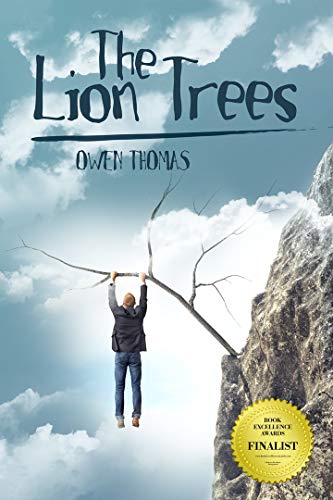The Lion Trees received a 4+ star review, making it an IndieReader Approved title.
Following find an interview with author Owen Thomas.
What is the name of the book and when was it published?
The Lion Trees was first published in 2014. The Audible edition of The Lion Trees, recently reviewed by IndieReader, was released in 2021.
What is the book’s first line?
“Bitches and sirens; don’t they just always get the attention.”
What is the book about? Give us the “pitch”.
The Lion Trees is a work of literary fiction about an ordinary American family. Its central characters are a family of five – the Johns—living in Columbus, Ohio in the year 2005. George W. Bush is well into his second term. The Iraq War is raging. Hurricane Katrina has landed. The Johns family is quietly, and then not so quietly, unraveling. In shades of Tom Wolfe’s A Man in Full, Jonathan Franzen’s The Corrections, Barbara Kingsolver’s The Poisonwood Bible and William Faulkner’s The Sound and the Fury, the Johns family story, at turns dramatic and comic, is woven in four distinct narrative voices: Hollis, Susan, David and Tilly.
Hollis, the disaffected paterfamilias, simply wants some respect. After decades of loyal service as a commercial banker, Hollis finds himself callously nudged into early retirement by a merge-happy bank looking to make room for younger, shallower talent. He is home now, amid indistinguishable days, taking stock of his many attributes and exploring new pursuits to deepen his consciousness—like Buddhism, bonsai trimming, vibrational meditation and, increasingly, oenophilia – pursuits that his family, and others lost in the fog of their shallow, media-driven narcissism, pointedly fail to appreciate. Relief, at last, comes with the sudden arrival of Suki Takada, the daughter of a powerful Japanese bank president in need of an escort on her tour of Ohio graduate schools. Young enough to be Hollis’ own daughter, Suki is a kind of confirmatory narcotic, addictive and aphrodisiacal, offering herself up as an affirmation of everything Hollis marvels about himself. She will either return Hollis to the full potency of his lost youth or, as he races cross-country chasing ghosts of the past, strip away every last dignity and conceit until there is nothing left but the truth.
Hollis is not alone in the maelstrom of identity confusion. His wife, Susan, for instance, is waking up after forty years of marriage to realize that she has been living Hollis’ life, not her own. When a lesbian biker undertakes to reconnect Susan with a political past long abandoned, Susan must not only reevaluate her identity, but what and who in her life is worth keeping.
David, the eldest son, is a high school history teacher trapped in the past. Teaching hopelessly incurious students at the very school from which he graduated, David wilts in the shadow of his father’s judgment and success. Try as he may, reason for optimism is elusive. It does not help matters when one of his students goes missing and David quickly becomes the unrelenting preoccupation of the Columbus Police Department. Proving his innocence – if that is possible—will require more than the help of Glenda LeVeau, his high-priced, colorfully embonpoint lawyer who just may be interested in sexually offsetting her fee. It will require more than the help of Lonnie Lumkin, a public defender who eats root vegetables out of his briefcase. Not even the inimitable Caitlin Carson Lewis, an out-of-nowhere, southern, pot-smoking hospice worker who drives a decommissioned ambulance and who seems to know David better than he knows himself will be enough to save him. David must save himself.
The Johns’ only daughter, Tilly, does everything she can to live down to her father’s low expectations. Working in Hollywood as an up-and-coming starlet provides Tilly with ample opportunity to offend Hollis’ sensibilities and sharpen their long estrangement. Playing the “dead hooker” on bad television crime dramas, for example. And sleeping with her directors. That she is driven to do such things is beyond question. But exactly why is a mystery.
The path to illumination begins when Tilly receives an offer to play the role of Colonel Elena Ivanova in the screen adaptation of Angus Mann’s classic story, The Lion Tree. It is the role of a lifetime, not only because Tilly so powerfully identifies with Colonel Ivanova, but also because of her formative associations with two men behind the disaster-prone production. One of those men is acclaimed director Blair Gaines, who is determined to own Tilly, even if it means sacrificing the project. The other is Angus Mann himself, a reluctant consultant on the film, who seems to generally loathe the existence of Hollywood and its perversions of literature, including the very possibility that someone of Tilly’s reputation might inhabit his beloved Ivanova.
Tilly’s lifelong journey of self-discovery, forgiveness and redemption, threads its way from Ohio to California to Africa and back again, a path mined with all manner of salacious scandal of a kind that Hollywood and its ingénue starlets are very familiar. But no single twist of events in Tilly’s life will prove to be more revealing than the dark past that haunts the great Angus Mann and that wrought his most famous story. Ultimately, her work with Angus and Blair on The Lion Tree will raise for Tilly fundamental questions of the self, the answers to which will lead her back to Ohio, to her father Hollis, and to the secrets buried in the basement of her childhood home. Only there will she find her true self and confront the lion tree of her own heart.
What inspired you to write the book? A particular person? An event?
The psychological premise of the book – that each of us works very hard in life to serve an identity, a residual sense of ourselves developed since childhood, even if that identity is irrational, maladaptive, and dangerous – was very compelling. I wanted an entertaining cast of characters who could serve as captivating and entertaining vessels for the idea that it is usually what we believe about ourselves that sets the table for our lives. The plots in this book are numerous and interwoven, ranging from comedic to tragic, and from highly dramatic to slice-of-life observant, populated by dozens of characters, but the heartbeat at the center is always the same: our true master, for better or worse, is out own self-concept.

The main reason for reading any work of fiction is, first and foremost, to be entertained. If the book is not ultimately entertaining enough to hold your attention, then nothing else matters. I set out to write a very entertaining book and, judging from the reaction and comments of so many readers around the world over the years, I feel satisfied that I accomplished that goal. My great hope is that readers will finish The Lion Trees with a sense of having been edified and fulfilled at a level deeper than they expected. Many readers have remarked that reading The Lion Trees has given them a new perspective on their own personal relationships. This book does tend to provoke a certain amount of self-examination and reflection. But, at the very least, readers are in for an entertaining, unpredictable ride.
What’s the most distinctive thing about the main character? Who-real or fictional-would you say the character reminds you of?
There are four main characters in this book – Hollis, Susan, David and Tilly – and they each take roughly equal turns dominating the narrative. None of those characters are modeled after any single person, either real or fictional. They are each truly amalgams of real and fictional people I have known or experienced, infused with the hallmark traits of personality types that most people would recognize. Hollis, for instance, reminds me in some respects of Charles Croker, the lead character in Tom Wolfe’s novel A Man in Full. Hollis and Charles share a certain indomitable conceit about their importance in the world. And yet, other aspects of Hollis come from other influences, both real and fictional.


The Lion Trees is the first book I published. It did so well, I have kept writing and have since published five other books, all award-winners: Signs of Passing, Mother Blues, This is the Dream, Message in a Bullet – A Raymond Mackey Mystery (Book 1) and The Russian Doll – A Raymond Mackey Mystery (Book 2).
What do you do for work when you’re not writing?
When I’m not writing, I’m editing or marketing. These days I seem to cycle relentlessly through those three endeavors. Living on Maui provides no end of distraction in the garden or at the beach, but whatever I happen to be writing at the time is usually dominating most of the other thoughts in my head. That’s a good thing. I really love what I do. In a previous life I practiced law. This is better.

Ideally, I try to spend 4-5 hours a day writing or working on writing-related projects. Sometimes I get in 6 hours of work, and because we do not live in an ideal world, sometimes the number is closer to zero. Nevertheless, whatever the number, I believe it is important to find a way to spend some amount of time every day working on whatever book I am writing (and I am usually working on two to three books at the same time, albeit each in a different stage of production). Writing novels, at least for me, requires creative momentum; keeping the ball rolling is essential.
What is the best and the hardest part of being an indie?
The best part and the hardest part of being an indie author happen to be the same thing: freedom. It is not unlike the best part and hardest part of leaving one’s youth and becoming an adult. The world is suddenly your oyster, but it is up to you and only you to crack that sucker open. In the world of writing, that means a lot of work and learning everything on your own as you go. Lots of trial and error. Lots of mistakes. Lots of opportunity to fall prey to people who are looking to take you nowhere on very expensive rides (Beware: opportunists and charlatans abound!). Nevertheless, there is also immense satisfaction in learning the industry from the ground up and watching yourself improve. There is also this: being an agented, traditionally published author is not always, or even usually, the golden ticket that writers imagine. New writers tend to see that as the best, if not the only, path to the Promised Land of literary success, but in the modern era of publishing that sentiment is not as true as it once might have been.
What is a great piece of advice that you can share with fellow indie authors?
My advice would be this: don’t worry about selling. Kick the commerce part of it out of the room for the writing phase and lock the door. Don’t write what the market expects you to write. Don’t write something you think will sell. Write with the sole purpose of doing justice to the creative vision in your head. Write something good. Write something authentic. Write something that moves you and you will move others. Shock yourself. Delight yourself. Have fun. Worry about selling later.
Would you go traditional if a publisher came calling? If so, why?
I would certainly take the phone call. I would also take the call of the agency looking for a conversation about adapting one of my novels to the screen (large or small). Part of being an indie writer is knowing in your marrow that success comes from being open to new directions and possibilities, even those you may have previously foresworn. Not all publishers are the same. Not all agents are the same. Not all writers are the same. Not all books are the same. I am open to the possibility that somewhere in the vastness of the traditional publishing universe, there is a good fit for a partnership for one, some or all my books. Until that good fit presents itself, I will remain open to the possibility but keep rowing my own boat. I invite anyone who is interested to join me on that journey, one book at a time. You can find me at https://www.OwenThomasLiterary.com.

